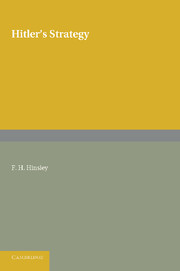Book contents
- Frontmatter
- Contents
- PREFACE
- Note on Sources and References
- CHAPTER I The German Navy, the Russian Pact, the British Problem and the Decision to Make War
- CHAPTER II The First Phase
- CHAPTER III The Invasion of Norway and the Fall of France
- CHAPTER IV An Invasion of England?
- CHAPTER V The Crucial Months, September to December 1940
- CHAPTER VI THE DECISION TO ATTACK RUSSIA
- CHAPTER VII North Africa, The Mediterranean and the Balkans in 1941
- CHAPTER VIII The Battle of the Atlantic in 1941
- CHAPTER IX German-Japanese Negotiations in 1941
- CHAPTER X 1942
- CHAPTER XI The End of the German Surface Fleet, January 1943
- CHAPTER XII Hitler's Strategy in Defeat
- APPENDIX A The German Surface Fleet
- APPENDIX B Germany's Infringements of the Naval Clauses of the Treaty of Versailles
- APPENDIX C The New U-Boats
- INDEX
CHAPTER IX - German-Japanese Negotiations in 1941
Published online by Cambridge University Press: 05 June 2016
- Frontmatter
- Contents
- PREFACE
- Note on Sources and References
- CHAPTER I The German Navy, the Russian Pact, the British Problem and the Decision to Make War
- CHAPTER II The First Phase
- CHAPTER III The Invasion of Norway and the Fall of France
- CHAPTER IV An Invasion of England?
- CHAPTER V The Crucial Months, September to December 1940
- CHAPTER VI THE DECISION TO ATTACK RUSSIA
- CHAPTER VII North Africa, The Mediterranean and the Balkans in 1941
- CHAPTER VIII The Battle of the Atlantic in 1941
- CHAPTER IX German-Japanese Negotiations in 1941
- CHAPTER X 1942
- CHAPTER XI The End of the German Surface Fleet, January 1943
- CHAPTER XII Hitler's Strategy in Defeat
- APPENDIX A The German Surface Fleet
- APPENDIX B Germany's Infringements of the Naval Clauses of the Treaty of Versailles
- APPENDIX C The New U-Boats
- INDEX
Summary
Hitler's negotiations with Japan, in the months before the attack on Pearl Harbour, were inconsistent with the object he sought with his policy in the Atlantic. At first, it is true, his efforts with Japan were guided by the hope that, in conjunction with the German attack on Russia, the Japanese entry into the War would ensure the final collapse of Great Britain and deter the United States from entering the struggle; and to this end his first objective was to persuade the Japanese to attack Singapore without delay. But he was forced to admit from the outset that such a move by Japan might bring America in on Great Britain's side; and, as the negotiations proceeded, provoked by Japan's delaying tactics, he became increasingly disposed to accept that risk, despite his caution in the Atlantic.
Pressure to persuade Japan to attack Singapore was first brought to bear on 23 February 1941, at a conference between Ribbentrop and General Oshima, the Japanese Ambassador in Berlin. Ribbentrop was at pains, during this interview, to emphasise that Germany was already the victor in the West, that the collapse of Great Britain was only a matter of time. But he was even more anxious to persuade Japan to enter the War at once, with an attack in South-East Asia. Japan must act soon if she wished ‘to secure for herself, during the War, the position she wants to hold in the New World Order at the time for the Peace Treaty’. ‘We have the desire’, he went on, ‘to end the War quickly and to force England to sue for peace soon. To this end the co-operation of Japan is important.…’ Japan's intervention would destroy Great Britain's key position in the Far East:
the effect on the morale of die British people would be very serious and this would contribute towards a quick ending to the War. … A surprise intervention by Japan was bound to keep America out of the War. America, who is at present not armed and who would hesitate to expose her Navy to risks west of Hawaii, could do this even less in such an eventuality.
- Type
- Chapter
- Information
- Hitler's Strategy , pp. 176 - 188Publisher: Cambridge University PressPrint publication year: 2013

